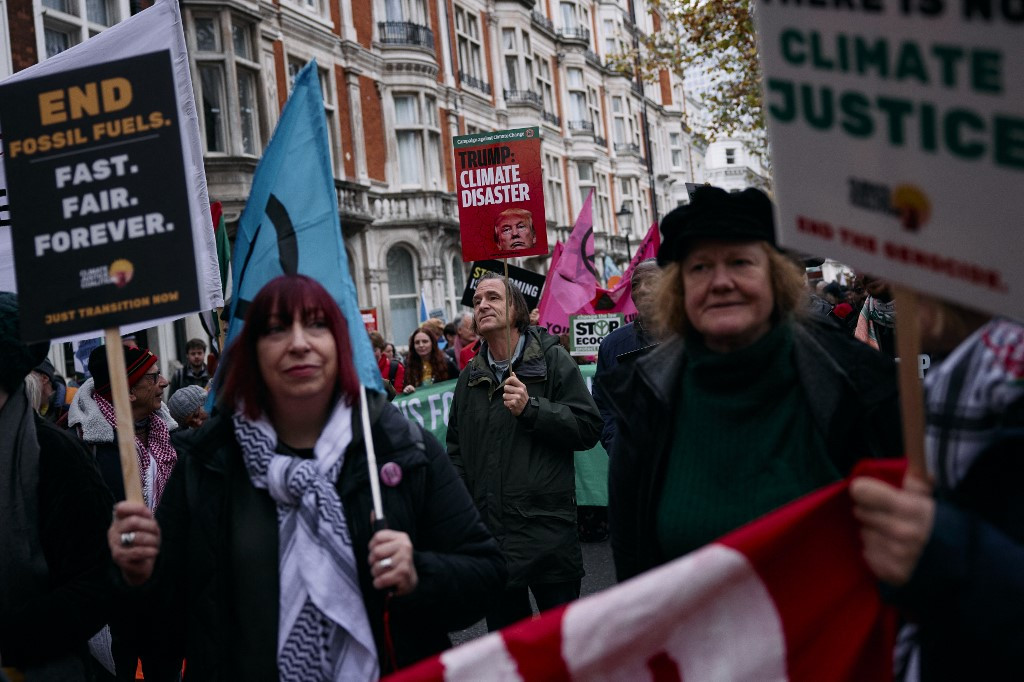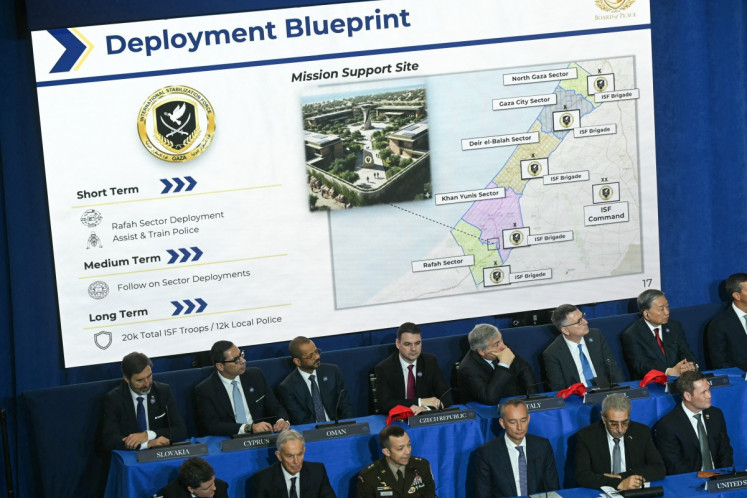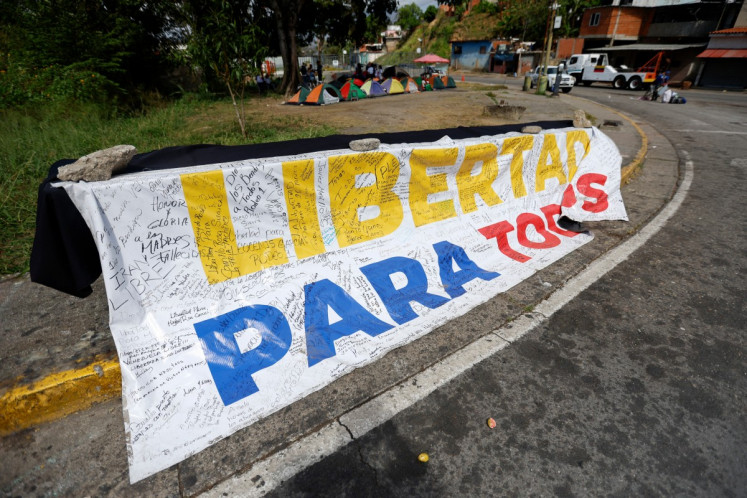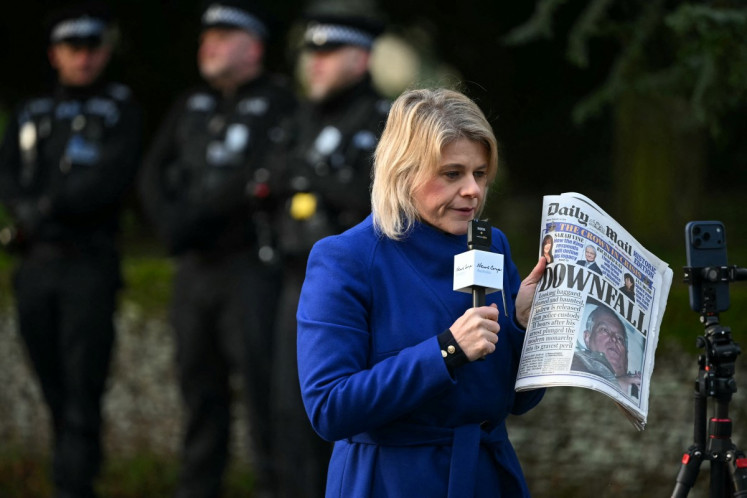Popular Reads
Top Results
Can't find what you're looking for?
View all search resultsPopular Reads
Top Results
Can't find what you're looking for?
View all search resultsTop UN court to open unprecedented climate hearings
Activists hope the legal opinion from the ICJ judges will have far-reaching consequences in the fight against climate change.
Change text size
Gift Premium Articles
to Anyone
 Protesters hold up placards as they gather for a combined March for Global Climate Justice, organized by the Climate Justice Coalition, in London, the United Kingdom, on Nov. 16, 2024, “to demand the UK government ends our reliance on fossil fuels, pays up for climate finance, and ends its complicity in Israel's escalating genocidal violence“. (AFP/Benjamin Cremel)
Protesters hold up placards as they gather for a combined March for Global Climate Justice, organized by the Climate Justice Coalition, in London, the United Kingdom, on Nov. 16, 2024, “to demand the UK government ends our reliance on fossil fuels, pays up for climate finance, and ends its complicity in Israel's escalating genocidal violence“. (AFP/Benjamin Cremel)
T
he world's top court will start unprecedented hearings next week aimed at finding a "legal blueprint" for how countries should protect the environment from damaging greenhouse gases, and what the consequences are if they do not.
From Monday, lawyers and representatives from more than 100 countries and organizations will make submissions before the International Court of Justice (ICJ) in The Hague, the highest number ever.
Activists hope the legal opinion from the ICJ judges will have far-reaching consequences in the fight against climate change.
But others fear the UN-backed request for a non-binding advisory opinion will have limited impact, and it could take the United Nations' top court months, or even years, to deliver.
The hearings at the Peace Palace come days after a bitterly negotiated climate deal at the UN climate change conference, or COP29, in Azerbaijan, which said developed countries must provide at least US$300 billion a year by 2035 for climate finance.
Poorer countries have slammed the pledge from wealthy polluters as insultingly low and the final deal failed to mention a global pledge to move away from planet-heating fossil fuels.
'No distant threat'
The UN General Assembly last year adopted a resolution in which it referred two key questions to the ICJ judges.
First, what obligations did states have under international law to protect the Earth's climate system from greenhouse gas emissions?
Second, what are the legal consequences under these obligations, where states, "by their acts and omissions, have caused significant harm to the climate system and other parts of the environment?"
The second question was also linked to the legal responsibilities of states for harm caused to small, more vulnerable countries and their populations.
This applied especially to countries under threat from rising sea levels and harsher weather patterns in places like the Pacific Ocean.
"Climate change for us is not a distant threat," said Vishal Prasad, director of the Pacific Islands Students Fighting Climate Change (PISFCC) group.
"It is reshaping our lives right now. Our islands are at risk. Our communities face disruptive change at a rate and scale that generations before us have not known," Prasad told journalists a few days before the start of the hearings.
Launching a campaign in 2019 to bring the climate issue to the ICJ, Prasad's group of 27 students spearheaded consensus among Pacific island nations including his own native Fiji, before it was taken to the UN.
Last year, the General Assembly unanimously adopted the resolution to ask the ICJ for an advisory opinion.
Legal blueprint
Joie Chowdhury, a senior lawyer at the US and Swiss-based Center for International Environmental Law, said climate advocates did not expect the ICJ's opinion "to provide very specific answers".
Instead, she predicted the court would provide "a legal blueprint in a way, on which more specific questions can be decided," she said.
The judges' opinion, which she expected sometime next year, "will inform climate litigation on domestic, national and international levels."
"One of the questions that is really important, as all of the legal questions hinge on it, is what is the conduct that is unlawful," said Chowdhury.
"That is very central to these proceedings," she said.
Some of the world's largest carbon polluters, including the world's top three greenhouse gas emitters, China, the United States and India, will be among some 98 countries and 12 organizations and groups expected to make submissions.
On Monday, proceedings will open with a statement from Vanuatu and the Melanesian Spearhead Group which also represents the vulnerable island states of Fiji, Papua New Guinea and the Solomon Islands as well as Indonesia and East Timor.
At the end of the two-week hearings, organizations including the EU and the Organization of the Petroleum Exporting Countries are to give their statements.
"With this advisory opinion, we are not only here to talk about what we fear losing," the PISFCC's Prasad said.
"We're here to talk about what we can protect and what we can build if we stand together," he said.









